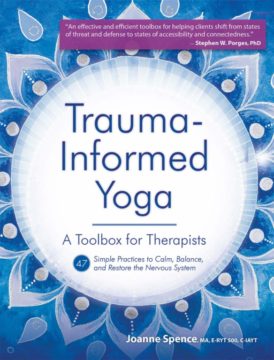
Why Joanne Spence, as a LifeForce Yoga Practitioner and mental health specialist, wrote Trauma-Informed Yoga: A toolbox for therapists: 47 simple practices to calm, balance, and restore the nervous system.
I remember the early years of working as the first yoga therapist at Western Psychiatric Institute and Clinic (WPIC). At the time, I had a significant number of hours of yoga teacher training under my belt, and I had years of experience as a social worker (albeit Australian-trained and not licensed in the US). I had been teaching yoga full-time for six years and in that time I gained, a great deal of experience in a diverse array of environments. I taught in community spaces, yoga studios, churches, schools, and even hallways, working with all types of bodies. It seemed like a dream come true to be invited to teach at WPIC and be able to combine my love, and my life-changing experience, of teaching yoga with my desire to serve people experiencing acute mental illnesses.
At WPIC, I was working with people who were hospitalized and receiving inpatient treatment for their mental health. As strange as it may sound, I was delighted to be working in such a space. Indeed, I saw it as a calling. However, before each class, I experienced an agonizing time during which I knew I knew stuff about yoga, had experienced a personal healing of my mental and physical health through yoga, yet that self-knowledge was not yet transferring into something I could teach. I was in an austere, psychiatric hospital with little or no ambience, no yoga props, and accompanied by the regular occurrence of many distracting peripheral activities.
Order Trauma-Informed Yoga: A Toolbox for Therapists Today!
I muddled through those first few years and settled into a gentle, yoga practice from a chair. I remember leaning on books such as Amy Weintraub’s Yoga for Depression as an initial and valuable resource. Feedback from patients was incredibly helpful, along with my own clinical observations. So, when I learned that there was an upcoming week-long LifeForce Yoga training in Tucson, I committed to figuring out how I could attend – no small thing when you work part-time at a hospital, own and run a yoga studio, and have three school-aged children. A supportive spouse – and my hunger for more knowledge – led the way in making this training a reality for me.
I loved the training so much that I signed up for the second seven-day training the following May. That first training was the first time I had heard the words “trauma-informed” and “yoga” in the same sentence. I found language for the things I felt in my own body, feelings that related to my own trauma, that I had never before associated with each other. The trainings added significantly to my knowledge base, as I had hoped. My agonizing before classes dissipated. I now knew how to apply my yoga knowledge to mental health settings. Of course I could not know all that could be known on the topic of yoga and mental health, yet at the same time, I understood and witnessed the fact that work in the subtle body – through the breath and a very small amount of movement – did wonders for my clients (and for me). Sometimes my clients seemed to experience everyday “miracles” with just a handful of practices.
Over time, the idea grew into a book…how do I apply very small doses of yoga movement and breathwork – many things I learned through LifeForce Yoga – to group and individual clinical settings? Was it as simple as I saw it, felt it, and observed it to be? Perhaps, perhaps not. But I wanted to address the reality and intensity of working with very ill individuals and seeing shifts that I observed as nervous system regulation.
Over the intervening years, I developed go-to practices. I began to see the benefit that any one of those practices could be effective on its own, based on its own merits. I eagerly followed the research on dose response to yoga, although there’s not a lot of it. But it seems that yoga “does” its best work as a daily practice in as little as 5-15 minutes. If you balk at this sentence, think of the science of habit. If you can habituate 5 minutes of practice, the duration will increase, mostly because your body will want to do more. And, we get better at things we practice. Such small increments of time were also workable in talk therapy sessions.
At some point early on, I realized and acknowledged the privilege it was for me to invest two whole weeks (and more) to dive deeply into these yoga teacher trainings. That, and teaching full-time adds up to an embodied experience that not all therapists or yoga teachers have the time or resources for. The more I taught foundational practices, the more I heard “can you come every day and teach us?” I could not do that, but I did spend a considerable amount of time (nearly a year) not only writing down the practices themselves, but also how, why, and when to do them. I still highly recommend that you plan and figure out how to do more training. Until then, my hope is that my book will be a reliable guide to get you started on how to share with everyone you meet the basics of breath work and simple movement to affect mood and regulate the nervous system!
Congratulations 🎉 Joanne! This is a thoughtful article about your own evolution into a yoga therapist from the weaving together of your experience, training, compassion and insight.